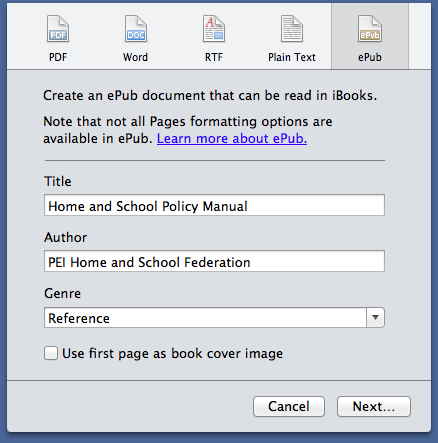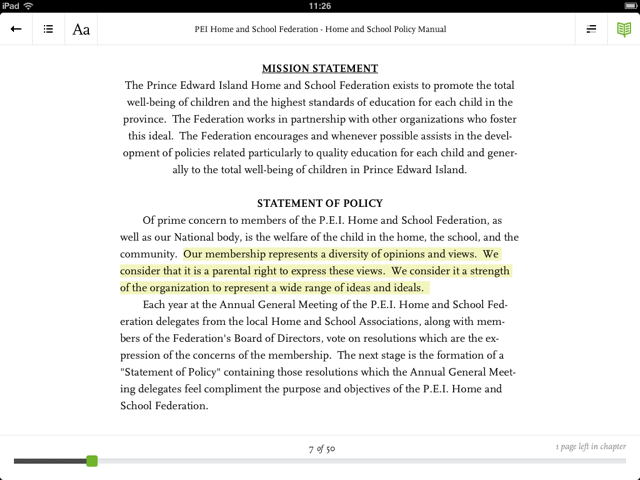Did you know that recent versions of Apple’s Pages word processing application can export to the ePub format? Presumably this was a step taken by Apple to enhance the utility of its own iBooks application, but ePub is ePub, and Readmill can read it too.
Last week I had a PEI Home and School Federation meeting and in advance of the meeting I receive a Microsoft Word copy of the Federation’s Policy Manual. Because I wanted to review the manual and highlight and share relevant passages with my fellow board members, I loaded the Word file into Pages, and exported it as an ePub, then emailed myself the result and opened the email on my iPad and opened the ePub in Readmill’s iPad reading app:


I then used the Readmill reader on the iPad to read the manual and highlight passages; as I did this, the highlights accumulated on the Readmill web page for the manual, from which I could share them, comment on them, and otherwise have the highlights take on a digital life of their own. Like this, for example:
Highlighted by Peter Rukavina in Home and School Policy Manual
This is an example of Readmill’s great power and competitive advantage: Kindle, Kobo, Nook and their brethren, while useful in their own way, exist as platforms with the ultimate goal of getting you to buy more books. They are the razors for which you are to buy an endless stream of razor blades. Readmill, because it’s not looking to sell you books, is not similarly shackled, and so can optimize for things like openness and sharing and reuse, freeing words from the boundaries of their books and allowing them to take on a life of their own.
Contrast this, for example, to the Kindle approach to the same functionality: I read the book Ah-Choo!: The Uncommon Life of Your Common Cold in the Kindle app on my iPad and made a lot of highlights. I can login to kindle.amazon.com and see and manage all my highlights for that book, but the individual highlights don’t have their own URLs, and there’s no way for me to share my highlights with others — when I logout of Amazon.com the page I was looking for my highlights devolves into a generic summary page with a selection of popular, uncredited highlights. That’s what digital reading looks like without optimizing for sharing.
Yes, I’m sounding like a cheerleader for Readmill, but I see great potential in the Readmill ecosystem, and it’s already proving to be a useful part of my day-to-day workflow.

 I am
I am
Comments
Thanks!
Thanks!
Postscript: thanks to
Postscript: thanks to Readmill’s innovative Kindle Bookmarklet, my Kindle highlights for Ah-Choo! now have a new life in Readmill in addition to their life inside the Kindle prison.
Add new comment